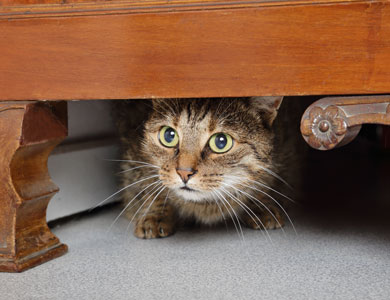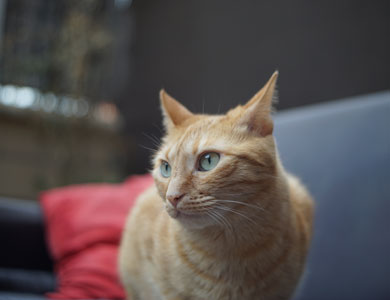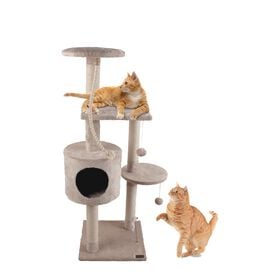Cats are uniquely sensitive animals and can experience intense emotions when certain situations disturb their environment. Understanding these reactions and learning how to manage anxiety and stress in cats is essential to ensure the well-being of your precious companion.
First and foremost, make sure you’ve eliminated any medical cause for their responses. For example, if a cat experiences pain when their muscles tense because of an illness or a disease, they might associate this pain with a specific person or situation, leading to an aversion to said person or situation.

Why do cats hate loud noises?
Cats are instinctively afraid of loud sounds. Sudden and booming noises such as thunder, firecrackers or vacuum cleaners can make them feel exposed and vulnerable. Keep in mind that while cats are excellent predators, they’re also potential prey for other animals higher up on the food chain. So even domesticated housecats have an internal alarm system.
Why are some cats afraid of strangers?
If your cat hides when they hear the doorbell ring, they might have associated being near strangers with unpleasantness or they might not have been properly socialized as a kitten. Even if cats are capable of socialization, they are not naturally sociable beings in the way dogs are.
In nature, cats are solitary creatures and meet their needs on their own. Unless a kitten was socialized a very young age, evolution has made it that they will not instinctively trust humans.
Moreover, even if socialization has taken place, cats might have had unpleasant experiences with some people, which in turn leads to mistrust. In fact, one single negative experience (getting their tail pulled by a child, for example) might be enough to convince a cat that they should hide when guests show up.
In brief, to understand a cat’s response to loud noises and strangers, we need to know more about their instinctual responses and past experiences. By adopting approaches designed to help them manage their anxiety, we can create an environment where our feline friends feel comfortable and safe, even when exposed to stimuli that may bother them.

Recognizing signs of fear
When your cat is confronted with something that terrifies them, they may exhibit signs of stress and anxiety. Even though not all cats will react the same, signs they are afraid generally include:
- agitation
- shaking
- searching for hiding places
- excessive meowing
- dilated pupils
- cowering
- attempts to flee
Also read : What your cat’s tail is telling you
Some cats may also press up against their owners to seek comfort from them.
How to soothe a fearful cat?
There are a number of things you can do to help your anxious cat.
Creating a secure space
Some people may be tempted to try to force their cat to face their fears by having them stay put in the presence of guests, for example. They believe that with time, their cat will get used to the situation and understand that they are not in danger. This method, known as “immersion”, tends to have the opposite effect and reinforce a cat’s anxiety.
It is actually preferable to work in a space where your cat can hide when they feel anxious. This will help alleviate their fears. A simple cardboard box covered with a soft blanket and containing a few toys may be suitable. Place this box in a location that gives them a view of guests or the thing they’re afraid of but make sure they’re far enough away from that “danger” to feel safe. This will help them get use to their source of fear.
There are also soothing pheromone diffusers that help create a relaxing environment for your cat. Talk to a Mondou advisor in-store.

The power of food and play
If your cat doesn’t experience intense fear but a certain apprehension or a bit of anxiety when exposed to a noise or object, you can simply offer them treats or their usual food or play with them when the situation occurs again. For instance, if you see that a storm is brewing on the horizon, get a few treats or their favourite toy. Once the thunder becomes audible, reward them with a treat or start playing with them.
Giving them a treat can alter their emotions, creating a positive association with their source of fear. On the other hand, this technique may simply not succeed. That’s the worst that can happen.
Desensitization and counterconditioning
Desensitization and counterconditioning are some of the most efficient methods of helping a cat get used to what they fear. However, it’s important to note that even if this technique is relatively simple, it often requires detailed explanations that go beyond the scope of this article.
If you want to alleviate your cat’s fear of guests, you need to find the right distance at which they are not afraid of the person. When you have, offer them cat treats. If your cat refuses to eat these treats, they are too close to their source of anxiety. If the cat accepts the treat, simply continue to provide them with cat treats and progressively get them closer to their source of fear. That way, the cat will associate the presence of the person in question with something pleasant (treats).
After several sessions (not all in one day), your cat will understand that the guest is associated with treats and will naturally approach this person to receive them. It may take a few sessions or even several weeks for your cat to realize this.

Avoid punishments and reprimands
When your cat shows anxiety when exposed to a noise or person, it’s important not to reprimand them, tell them “no” or punish them physically. These actions will only heighten their anxiety and reinforce their fears, thereby creating a vicious cycle.
Consult a professional
If your cat experiences intense anxiety when hearing loud noises or in the presence of certain people in a way that affects their quality of life, you should consult a veterinarian or a feline behaviour expert. They will be able to assess their specific situation and recommend ways to help your cat manage their anxiety.
By understanding a cat’s natural reactions to loud noises and finding the right ways to alleviate their anxiety, you’ll be able to create a calm environment where your feline companion feels safe, even when external factors seem frightening.
Also read : Superstition: do black cats really bring bad luck?






